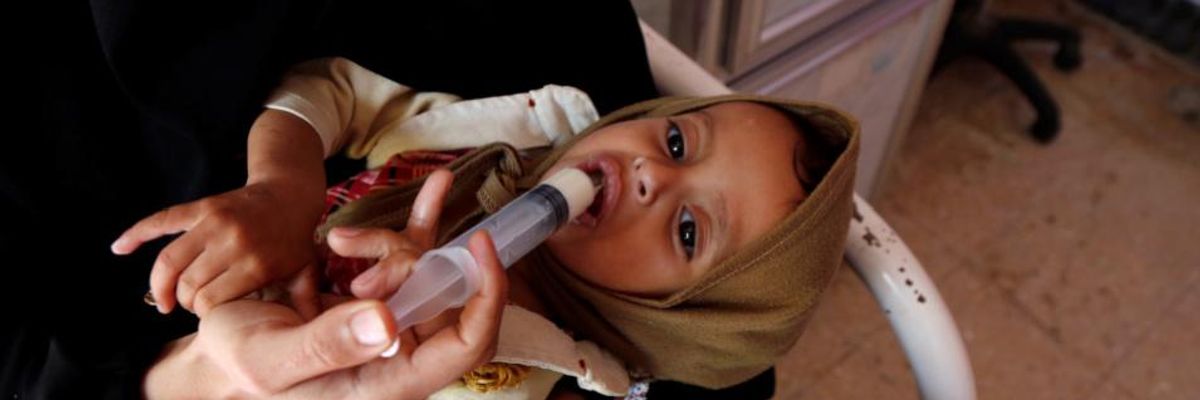Top officials at the United Nations on Thursday urged U.S. Secretary of State Mike Pompeo to reverse his plan to designate the Houthis in Yemen as a foreign terrorist organization, warning that if the Trump administration's policy goes into effect, it would push the nation into a "catastrophic" famine--worse than any seen in the past four decades--that could leave hundreds of thousands or even millions of innocent people dead.
Mark Lowcock, Under-Secretary-General for Humanitarian Affairs and Emergency Relief Coordinator, told the U.N. Security Council that the likely humanitarian impact of Pompeo's widely criticized move to label the Houthis a terrorist group would be a "famine on a scale that we have not seen for nearly 40 years."
"Would licenses and exemptions for aid agencies prevent that?" Lowcock asked. "The answer is no."
"What would prevent it? A reversal of the [U.S. State Department's] decision," he added.
In Yemen, home to 29 million people, 16 million "will go hungry this year," said Lowcock. "Already, about 50,000 people are essentially starving to death in what is essentially a small famine. Another five million are just one step behind them."
Earlier this week, NGOs explained that Pompeo's terrorist designation for the Houthis would disrupt the ability of aid agencies to sustain the flow of food and other live-saving goods into Yemen, where 80% of the population is in need of aid as a result of the U.S.-backed Saudi assault on the country.
Echoing those warnings, Lowcock said: "Yemenis are crowding into markets and shops to stockpile whatever they can afford. Families are terrified that no more food or other supplies will make it into the country."
Yemen imports 90% of its food, Lowcock said. Nearly all of that food, which Yemenis purchase using vouchers or cash provided by humanitarian groups, comes through a "commercial import system" that "aid agencies... simply cannot replace"--especially because the Trump administration's move is expected to cause food prices to spike by as much as 400%.
"The Yemeni companies who bring in most of the food are using words like 'disaster,' 'havoc,' and 'unimaginable'" to describe the consequences of Pompeo's decision, Lowcock said.
Most Yemenis live in the northern part of the country, which is largely under Houthi control. Human rights advocates at organizations like Oxfam say that a terrorist designation threatens to interrupt the delivery of food and other aid to places in Yemen that are home to 70% of the population--already suffering from malnutrition, starvation, and death prior to Pompeo's move.
Lowcock described how fears of being penalized by the U.S. are driving away commercial traders who deem it too risky to continue providing food:
For years, these companies have been moving mountains to sustain their very risk-averse global supply chains--including the suppliers, banks, insurers, and shipping lines. Some suppliers, banks, shippers, and insurers are ringing up their Yemeni partners and saying they now plan to walk away from Yemen altogether. They say the risks are too high. They fear being accidentally or otherwise caught up in U.S. regulatory action which would put them out of business or into jail.
Some of the Yemeni traders' suppliers, bankers, shippers, and insurers are saying they are hoping they can keep going. If they can, they say, their best-case estimate is that costs could go up by 400%. That will make it too expensive for many importers to keep doing business. And in any case, hardly anyone in Yemen could afford to buy food brought in at those prices.
As for the U.S. State Department's proposed licenses and guidance, which Pompeo reportedly has not finalized, Lowcock said that an exemption system would not prevent a massive famine from taking place in Yemen.
"With the designation, it's going to be catastrophic. It literally is going to be a death sentence to hundreds of thousands, if not millions of innocent people in Yemen."
--David Beasley, U.N.
"Those licenses do not yet exist," Lowcock pointed out. "Aid agencies have no confirmed details on how they will work or what activities will be eligible. The details apparently won't be ready until the day that the designation takes force, on January 19."
Moreover, Lowcock explained, most of the food is imported through commercial channels, not by aid agencies, so licenses and exemptions for humanitarian groups would fail to solve the problem. The only solution, he said, is a reversal of the U.S. State Department's decision to declare the Houthis a terrorist group.
As The Guardianreported Thursday, "Pompeo is implementing a scorched earth policy in his final days, much of it directed at Iran, in an attempt to make it difficult for the incoming administration to reach a negotiated settlement with Tehran. He is convinced that the Houthis are directed by Iran."
U.N. World Food Programme executive director David Beasley, who last month drew attention to the deteriorating conditions in Yemen, also addressed the Security Council on Thursday.
"We are struggling now without the designation," said Beasley. "With the designation, it's going to be catastrophic. It literally is going to be a death sentence to hundreds of thousands, if not millions of innocent people in Yemen."

